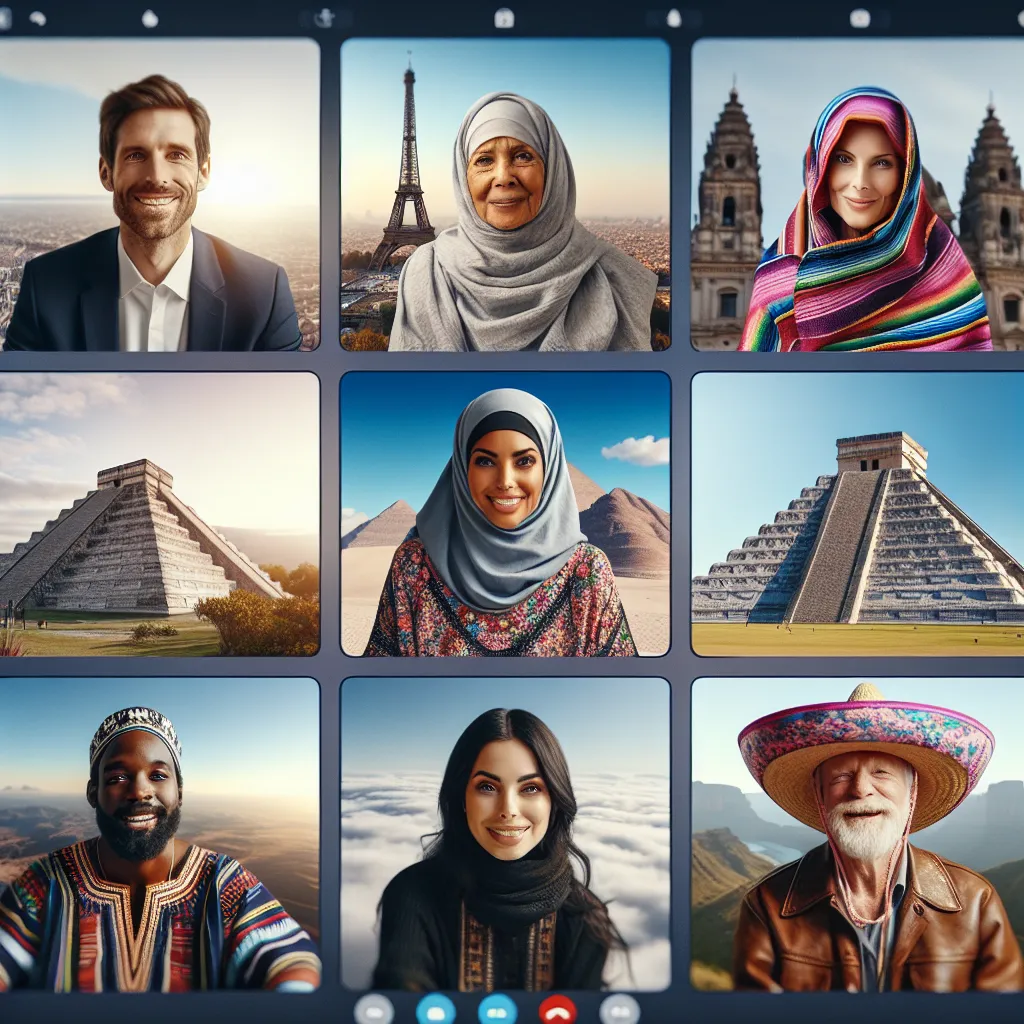Virtual cultural exchanges have become increasingly popular, especially in the wake of global events that limited physical travel. This topic is highly relevant for IELTS Speaking tests, as it combines elements of technology, cultural awareness, and personal experience. Let’s explore how to effectively tackle this subject in your IELTS Speaking exam.
Nội dung bài viết
- Understanding the Topic
- Part 1: Introduction and Interview
- Q: Have you ever participated in an online cultural event?
- Q: Do you think virtual cultural exchanges are effective?
- Part 2: Long Turn (Cue Card)
- Follow-up Questions:
- Part 3: Two-way Discussion
- Q: How do you think technology has changed the way we experience different cultures?
- Q: Do you think virtual cultural exchanges can replace traditional study abroad programs?
- Key Vocabulary and Phrases for High Scores
- Examiner’s Advice
Understanding the Topic
Before we dive into specific examples, it’s crucial to understand what a virtual cultural exchange entails. It typically involves interacting with people from different cultures through digital platforms, allowing participants to learn about each other’s customs, traditions, and ways of life without physically traveling.
 Virtual Cultural Exchange
Virtual Cultural Exchange
Part 1: Introduction and Interview
In this section, the examiner may ask general questions about cultural exchanges and online interactions. Here are some potential questions and sample answers:
Q: Have you ever participated in an online cultural event?
Band 6-7 Answer:
Yes, I have. Last year, I joined an online festival celebrating Asian cultures. It was quite interesting to see performances and presentations from different countries.
Band 8-9 Answer:
Absolutely! I’ve had the pleasure of participating in several online cultural events. Most notably, I attended a virtual Southeast Asian cultural festival last year, which showcased a diverse array of traditional performances, culinary demonstrations, and interactive workshops. It was a captivating experience that broadened my horizons significantly.
Q: Do you think virtual cultural exchanges are effective?
Band 6-7 Answer:
I believe they can be quite effective. They allow people to learn about other cultures without the need to travel, which is convenient and cost-effective.
Band 8-9 Answer:
I’m of the opinion that virtual cultural exchanges can be remarkably effective. They break down geographical barriers, making cultural learning more accessible and inclusive. While they may lack the immersive quality of physical travel, they compensate by offering a wide-ranging exposure to diverse cultures, often in a more structured and focused manner than casual tourism might provide.
Part 2: Long Turn (Cue Card)
Here’s a sample cue card related to the topic:
Describe a time when you participated in a virtual cultural exchange.
You should say:
- What the event was
- When and how you participated
- Who else was involved
- And explain what you learned from this experience
Band 6-7 Answer:
I’d like to talk about a virtual cultural exchange program I participated in last summer. It was an online event organized by my university in collaboration with a partner institution in Japan. The program lasted for two weeks and involved daily video conferences and group activities.
I participated from home, using my laptop to join video calls and collaborative online platforms. There were about 20 students from my university and a similar number from the Japanese university. We were divided into smaller groups for some activities.
During the program, we had sessions where we learned about each other’s cultures, including traditional arts, cuisine, and social norms. We also worked on joint projects, like creating presentations about global issues from our different cultural perspectives.
I learned a lot from this experience. It opened my eyes to how people from different cultures can have very different viewpoints on the same issues. I also improved my communication skills, especially in terms of expressing ideas clearly to people from different backgrounds.
Band 8-9 Answer:
I’d be delighted to share my experience of a virtual cultural exchange program I participated in last summer. It was an innovative online initiative jointly organized by my university and a prestigious institution in Kyoto, Japan. The program spanned two weeks and featured a rich tapestry of daily video conferences, collaborative projects, and immersive cultural activities.
I engaged in the program from the comfort of my home, utilizing my high-performance laptop to join video calls and access various cutting-edge collaborative platforms. The participant pool was diverse and dynamic, comprising approximately 20 students from my university and an equal number from our Japanese counterpart. We were strategically divided into smaller, multicultural groups for certain activities to foster more intimate cultural exchanges.
The program’s curriculum was meticulously crafted to provide a comprehensive cultural immersion. We delved into various aspects of each other’s cultures, from traditional arts and culinary practices to intricate social norms and contemporary issues. A particularly enlightening component was our collaborative project work, where we crafted in-depth presentations on global issues, viewing them through our respective cultural lenses.
This experience was profoundly educational and transformative. It broadened my horizons significantly, illuminating how cultural backgrounds can shape perspectives on global issues in ways I hadn’t previously considered. Moreover, it honed my cross-cultural communication skills, teaching me to articulate ideas with greater clarity and cultural sensitivity. Perhaps most importantly, it instilled in me a deeper appreciation for cultural diversity and the value of international collaboration in our increasingly interconnected world.
Follow-up Questions:
- How did the virtual nature of the exchange affect your experience?
Band 6-7 Answer: The virtual nature made it easier to participate, but sometimes there were technical issues that interrupted our conversations.
Band 8-9 Answer: The virtual format undoubtedly enhanced accessibility, allowing for participation without the logistical challenges of international travel. However, it also presented unique challenges, such as occasional technical hiccups and the absence of physical immersion. Nevertheless, these limitations spurred creativity in our interactions and heightened our appreciation for effective cross-cultural communication in digital spaces.
- What advantages do virtual cultural exchanges have over traditional ones?
Band 6-7 Answer: Virtual exchanges are more affordable and can involve more people from different places. They’re also more flexible in terms of timing.
Band 8-9 Answer: Virtual cultural exchanges boast several distinct advantages. They democratize access to international experiences, transcending financial and logistical barriers. They also offer unparalleled flexibility, allowing participants to engage from diverse locations and time zones. Furthermore, they facilitate more frequent and sustained interactions, enabling deeper, ongoing cultural dialogues that might be challenging to maintain in traditional, time-limited exchanges.
Part 3: Two-way Discussion
Q: How do you think technology has changed the way we experience different cultures?
Band 6-7 Answer:
Technology has made it much easier to learn about different cultures. We can watch videos, read blogs, and even talk to people from other countries easily. This has made cultural learning more accessible to everyone.
Band 8-9 Answer:
Technology has revolutionized our approach to cultural experiences in multifaceted ways. It has democratized access to cultural knowledge, allowing anyone with an internet connection to immerse themselves in virtual tours of world-renowned museums, participate in live-streamed cultural events, or engage in real-time conversations with people from diverse backgrounds. This digital proximity has fostered a global consciousness, making cross-cultural understanding more attainable than ever before. However, it’s crucial to note that while technology facilitates exposure, it cannot fully replicate the sensory richness of physical cultural immersion. The challenge lies in striking a balance between leveraging technology’s benefits and maintaining the authenticity of cultural experiences.
Q: Do you think virtual cultural exchanges can replace traditional study abroad programs?
Band 6-7 Answer:
I don’t think virtual exchanges can completely replace study abroad programs. While they’re useful, actually living in another country gives you a deeper understanding of the culture. However, virtual exchanges can be a good alternative for those who can’t travel.
Band 8-9 Answer:
While virtual cultural exchanges offer numerous benefits, I believe they complement rather than replace traditional study abroad programs. Virtual exchanges excel in accessibility, allowing more students to gain international exposure. They’re also cost-effective and environmentally friendly. However, the immersive experience of living in a foreign country, navigating daily life in a different language and cultural context, is difficult to replicate virtually. The serendipitous encounters and challenges faced during physical study abroad programs often lead to profound personal growth and cultural understanding. That said, virtual exchanges can serve as valuable preparatory tools or follow-up experiences to enhance traditional study abroad programs, creating a more holistic and sustained approach to international education.
Key Vocabulary and Phrases for High Scores
-
Cultural immersion [/ˈkʌltʃərəl ɪˈmɜːʃn/] (noun): The act of surrounding oneself in a different culture to learn about it.
Example: “The virtual exchange provided a unique form of cultural immersion without leaving home.” -
Cross-cultural communication [/krɒs ˈkʌltʃərəl kəˌmjuːnɪˈkeɪʃn/] (noun): The exchange of information between people from different cultural backgrounds.
Example: “Effective cross-cultural communication was crucial for the success of our virtual projects.” -
To broaden one’s horizons [/tə ˈbrɔːdn wʌnz həˈraɪznz/] (phrase): To expand one’s knowledge, experience, and understanding.
Example: “Participating in the virtual cultural exchange really helped to broaden my horizons.” -
Diverse [/daɪˈvɜːs/] (adjective): Including a wide range of different types.
Example: “The program included a diverse range of activities and participants.” -
To foster [/tə ˈfɒstə/] (verb): To encourage the development of something.
Example: “The exchange program fostered a deeper understanding between cultures.”
Examiner’s Advice
To excel in the IELTS Speaking test when discussing virtual cultural exchanges:
- Use a variety of vocabulary related to culture, technology, and communication.
- Provide specific examples from your experience to support your points.
- Demonstrate critical thinking by discussing both advantages and challenges of virtual exchanges.
- Practice speaking about your experiences fluently and coherently.
- Show awareness of global issues and cultural differences in your responses.
Remember, the key to a high score is not just what you say, but how you say it. Aim for clear pronunciation, appropriate use of complex structures, and a natural, conversational tone.
For more tips on improving your IELTS Speaking performance, you might find our articles on describing a live performance you attended and describing a time when you learned something from a different culture helpful in broadening your cultural vocabulary and speaking skills.


